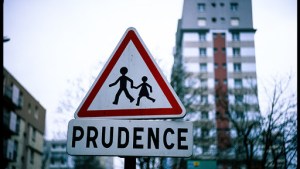We live in a society that rewards speed. Perhaps we could call it the reign of the “Fast and the Furious.”
Most video games for children and adolescents include speed as an essential element, as players jump over obstacles or conquer their enemies to reach the next level.
The same thing happens in our work and communications. We want our computer and our mobile phone to be faster and faster, so they can carry out our commands instantaneously. Then, of course, there is “instant” messaging; the name says everything.
Speed is valued because it helps us get more done in less time, and (supposedly) have greater control over the world around us. Countless movies and TV series idolize people who make quick decisions and get things done rapidly. Speed is a characteristic of many superheroes—and not just The Flash.
But, be careful! Speed is not helpful if it’s not accompanied by thought and reflection. If we act quickly, but without thinking first, it’s possible that we’ll run straight into problems.
Remember, haste makes waste!
Here’s an example that all of us will probably understand: If we’re trying to prepare a new recipe, and we get together the ingredients, we need to read the whole recipe first (instructions included) to know the order in which we have to prepare things, and if there are ingredients we need to prepare simultaneously. We have to take into account the relative cooking times of the different parts of a meal. If we only read the first step and start working right away, we may end up reading a step that says something like, “While doing the previous step, melt butter in a pan, so it’s ready at the same time …” Oops. Haste makes waste.
Learn the lesson
Some people start to act without knowing exactly what the best way is to reach their goal. For example, they might not bother to check traffic and construction reports before starting on a long drive; they think the most important thing is to get started, and the rest will work itself out. However, an hour or two later, stuck in traffic or on a long detour, they may end up realizing their mistake.
In our relationships with family, friends, and coworkers, all too often it happens that we hear some information and react impulsively. We get upset, we send an angry email, we raise our voice, we chew somebody out, we tell everyone how unfairly we’ve been treated… Unfortunately, later on we realize that the information we received was incomplete or not true, and that as a consequence, our reaction was totally inappropriate. We can’t turn the clock back, but we can learn our lesson for the next time.
Indeed, speed is often overvalued. In reality, it only works in our favor if we are also using our head, and that often means taking a little more time to reflect before acting.
How can we overcome this tendency to hastiness? It’s easy! Here are three steps …
1Think about what you're doing
What am I doing? This question will help us to pay attention to what we’re actually doing right now, instead of trying to multitask by looking at our cell phone or getting distracted with the conversation of the people next to us.
It’s also helpful to analyze if what we’re doing is actually the most important thing we can be doing right now, or if our priorities are off. By reflecting, we can determine if we’re getting carried away by what is urgent and leaving aside what’s truly important.
2Ask yourself why you’re doing what you’re doing
Am I acting based on a flash of temper? Am I indulging my vanity, hoping others will notice how fast I am compared to my other colleagues, friends, or family? Am I acting out of pride, because someone hurt my feelings and I want revenge? Am I actually hiding my own laziness, because I should really take the time to study what I’m doing first, but it’s easier for me just to go ahead and start doing something without working out the details first?
3Ask yourself what the consequences are of what you’re doing
If we really think about what we’re doing, we’ll realize that acting on impulse has consequences. It’s better to have some foresight than to have regrets later on. An ounce of prevention is worth a pound of cure, as they say! This can be particularly helpful when it comes to what we say to other people, how we spend money, what we “like” on social networks, and how we raise our children.
Thinking things through and avoiding impulsive actions won’t necessarily make us slower, but it will make us more effective and happier.

Read more:
Dear Prudence: Without You I’d Be Lost

Read more:
The reason you get irritable may not be what you think

